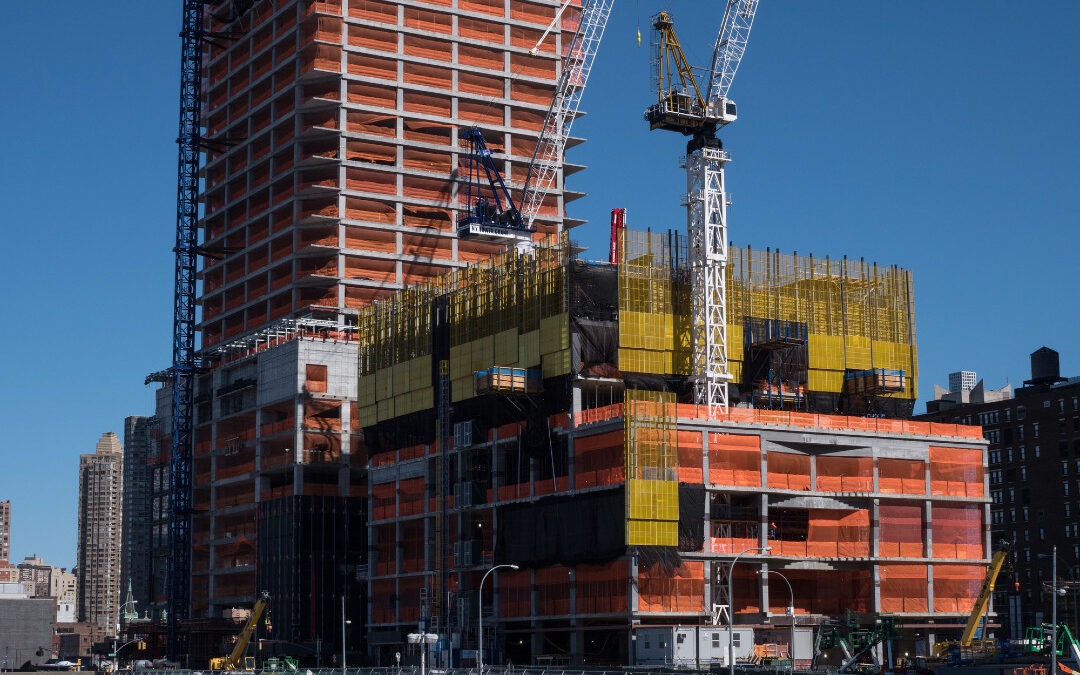A summary of the mandatory requirements follows. Project owners, developers and contractors should review the recommended best practices published by both NYS and NYC and any other controlling authority.
Safety Plan
General contractors must develop a Safety Plan to implement such requirements for each construction site. A Safety Plan template can be found here. They must submit an affirmation to the State that they have reviewed and will implement such requirements. The plan should be posted on the construction site in a conspicuous place.
Physical Distancing
It is mandatory to ensure 6 feet of distance between personnel unless the safety or core function of the work activity requires a shorter distance. For indoor work, the workforce must be limited to one worker per 250 square feet, excluding supervisors, unless more personal protective measures are implemented (e.g., face coverings). For activities typically requiring more personal protective equipment (PPE) than cloth-based face coverings and disposable masks because of the nature of the work, workers must wear N95 respirators or other PPE required by OSHA.
The occupancy of tightly confined spaces (such as elevators or hoists) must not exceed 50% of the maximum capacity, and occupants must wear acceptable face coverings. Contractors must implement measures to reduce bi-directional foot traffic in narrow hallways or spaces by using tape or signs with arrows; must identify six-foot distances in areas where lines typically form or people congregate; must limit on-site interactions between workers, prohibit non-essential visitors, and stagger their employee schedules to ensure social distancing and compliance with regulations.
Protective Equipment
Contractors must provide workers with acceptable face coverings at no cost to their employees. The face coverings must be cleaned or replaced after use or when damaged or soiled. Employers must limit the sharing of tools, machinery, materials, and discourage the touching of shared services. Workers must wear gloves when using shared objects or often touched services.
Cleaning & Hygiene
Contractors must adhere to the hygiene and sanitation requirements from the CDC[2] and DOH. They must keep cleaning logs on-site that document the date, time and scope of cleaning; provide hand hygiene stations on-site and sanitizer; provide cleaning and sanitation supplies for shared and often touched services and encourage their use; must conduct regular cleaning and disinfection of worksite equipment using products identified by the EPA as effective against COVID–19.
Testing & Screening
Employers must implement mandatory daily health screenings, including temperature checks, before employees begin work each day and for essential visitors. An employee who exhibits symptoms or test positive for COVID–19 may not enter the worksite, should be sent home immediately to contact his or her health care provider, and self-quarantine for 14 days. General contractors must designate site safety monitor whose responsibilities include ongoing compliance with the site Safety Plan, including the plan to monitor and reduce the spread of COVID–19.
Communication
Contractors should try to maintain a log of every person who has close contact with others on the worksite when possible, excluding deliveries performed with appropriate PPE or through contactless means, so all contacts may be identified, traced and notified if an employee is diagnosed with COVID–19. If a worker test positive for COVID 19, the employer must immediately notify state and local help apartments and cooperate with contact tracing efforts, including notification of potential contacts with that worker while maintaining confidentiality under state and federal law and regulations.
As New York City reopens, construction projects must adopt new rules and policies to reduce the risk of the spread of COVID-19. Project owners will look to the general contractors as the party responsible for site safety, to develop and install the Safety Plan to address the unique aspects of each construction project.
Yoars Law has decades of experience in the construction industry. We focus on being proactive legal advisors while providing transparent and predictable legal fees so our clients can manage their budgets effectively in an industry where controlling costs is one keystone in the success of a project.
[1] See Yoars Law’s post “NYC DOB Bans Non-Essential Construction & Demolition Sites during COVID-19 Outbreak” from 4/14/2020.
[2] Center for Disease Control

